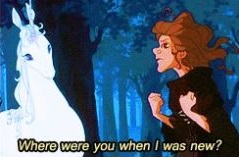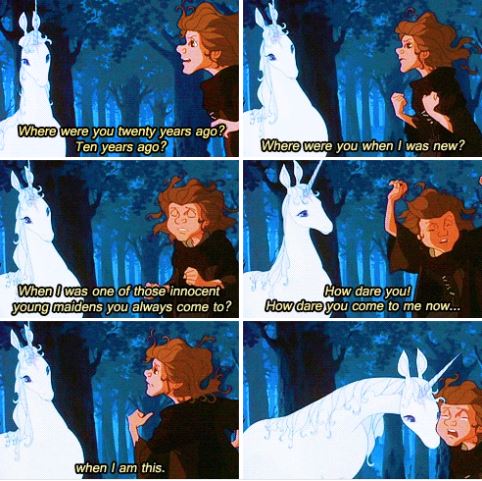 I’ve held off on this sort of topic a little. Now that I come to think of it, the reason for that is actually a sort of faint internalized shame, so now I am going to take a dose of the medicine I offered in my previous post and go for it.
I’ve held off on this sort of topic a little. Now that I come to think of it, the reason for that is actually a sort of faint internalized shame, so now I am going to take a dose of the medicine I offered in my previous post and go for it.
Starting today, I will from time to time dip into one of my favorite topics under the title ‘Living Mythos’: pop/geek culture and the philosophies and life lessons found therein. These will be sort of straddling the line between personal reaction and cultural criticism.
“The Last Unicorn” is a 1982 animated feature produced by Rankin-Bass based on the eponymous 1969 book by Peter S. Beagle. It is a quirky, slightly deconstructionist high fantasy musical that stands a good chance of breaking your heart.
This one is a personal sharing as more than a critique proper, but then, I tend to think the truest “critique” of art is how we respond to it.

Screencaps from “The Last Unicorn” featuring Molly Grue’s speech: “Where were you twenty years ago? Ten years ago? Where were you when I was new? When I was one of those innocent young maidens you always come to? How dare you! How dare you come to me now… when I am this?”
I have a running joke about how I hate unicorns. I don’t really, though they are rather over-played these days and I do have a history of being screwed over by them (that is another story).
But this… I feel this. I feel this in my heart, in my bones. Deeper than that – in my mitochondria if you can feel things there. I saw a lot of magic granted to others, then faded and gone for a long long time; decades even. And when a unicorn of sorts came to me at the end of 2016 I was already old.
I lost that too, I wasn’t ready for it. Now I don’t have a unicorn. Don’t get me wrong, there are other magics, and I am deeply grateful for everything I DO have now…. but still, but still…
I am old.
I am luckier than Molly. I have a strange feyness of my own, and I am young for my age where she is old. I have more time now than she did, and I am not relying on just one magic from someone else.
That’s the real lesson. The tragedies of “The Last Unicorn” are Molly Grue and King Haggard, who had the same affliction: an aching hole in their souls, a desperate yearning for the missing magic. Molly merely waited for it, and took up with the wrong people whose claim to magic was a lie. Haggard stole it, ruining others’ lives in a desperate bid to un-ruin his own. Molly, ultimately was lucky, and Haggard not… but they were both wrong.
You have to make it.
You CAN make it.
And that lesson was my unicorn more than anything else. I can do this? Now? When I’m already old…? Where were you when I was new?
I forgive you*. What else could I do? Scream about the relentless march of time? Waste what time I have left with lamentation? Cry that it’s too late, until it really is?
No, I won’t waste what blessings remain, or the hard-won lessons. Better yet, I want to pass them on. Help me do that. Tell everyone, tell yourself… you can neither wait for magic nor steal it, you have to make it. And you CAN make it. And you should.
So I will. And who knows, maybe someday yet another unicorn will come to Abbey Grue.
* As, ultimately, so did Molly. Her last line in this scene, after the pictured part, was “It’s all right. I forgive you.”
[This is an updated version of an article originally posted to Facebook on Oct 7, 2019]

Love the book, love the movie.
Here’s something I wrote that seems somehow related. I hope you like it!
When we are young and we first think about how we will make our ways in the world, we all know with a fairy-tale certainty that we will always remain the heroes of our own stories, and that heroes always triumph at the end. Our true identity as a prince or princess will be discovered, our name will be on the magazines or billboards or best-seller racks, our swing will win the World Series, our life story will be set on the shelf for future generations to read, and our hand will surely at length come to rest on the great lever that turns the world.
Then, as we set out on our journeys, most of us realize that none of these things will ever come true. We learn that we are standing on the side of a mountain, and that the only thing we can hope to accomplish with our lives is to pick up a tiny pebble and move it six inches up or down the slope. When we learn this, many of us give up in despair, and lose ourselves in sensation or apathy or even self-destruction.
The beginning of wisdom comes when we begin to look at the world and the world’s past, and we see how millions of people, all moving their own pebbles by their own tiny amounts, have made mighty cliffs vanish or rise up overnight, and over time have made mountain ranges rumble across the landscape like gazelles, and have thrown up whole continents and cast them down again into the sea.
And if we continue learning long enough, we find at last that our own pebble is tied to every other particle of the universe, so that the reverberations of how we move it will go on echoing outwards to the farthest limits of time and space until both end. And we learn that nothing to be done by any man or angel throughout creation will ever matter any more or any less than the momentous event of our pebble-moving, so that all the powers of heaven and earth wait to see what direction we will choose with hushed breaths and stilled wings.
@1 brucegee1962
Thanks for that. I love how it gets mythical at the end.
You know what came to mind when I read this? Not “The Last Unicorn”, but “Fight Club”. Tyler Durden’s speech about ‘waking up’ to the fact they’re not going to be rock stars and are very pissed off. Not that what you wrote sounds like that character; quite the opposite, what you wrote sounds like a really good response to that speech.
I never did get around to watching that one. It’s on my long list of “maybe someday after I retire” movies.
Reading about unicorns reminded me of this:
https://io9.gizmodo.com/how-to-write-a-sex-scene-between-a-unicorn-and-a-rainbo-575043190
I know it’s OT but this little story is cute if less than G-rated.